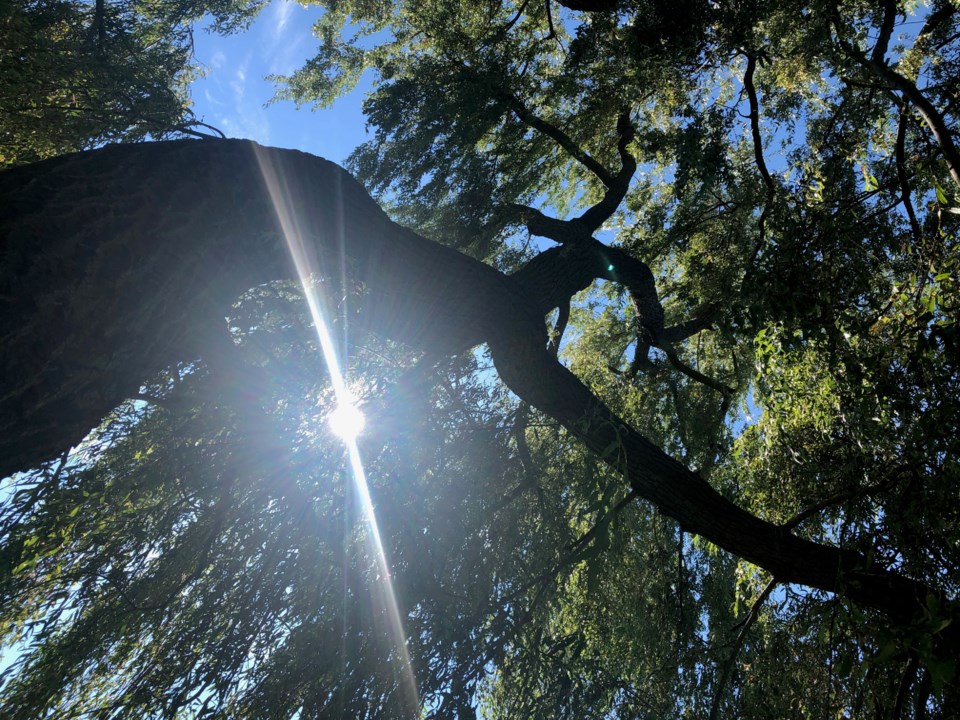Council sees the forest and the trees, and has thrown initial support behind town staff recommendations intended to strengthen Collingwood’s tree canopy.
During Monday’s (Aug. 8) strategic initiatives standing committee meeting, council voted in favour of spending up to $100,000 to retain a consultant to inform the next council on how Collingwood can better protect tree canopy. Councillors also gave initial approval to spend an additional $75,000 tree maintenance and removal in 2022, to be taken from the operating contingency fund reserve.
During Monday’s meeting, Coun. Deb Doherty spoke about the report and a path forward for the town to protect trees.
“This report ticks off so many boxes for me,” said Doherty. “It acknowledges we have fallen behind."
The town's Urban Forest Management Plan calculated the 2018 tree canopy coverage at 31.7 per cent.
“We have been feeling comfortable because we sit at a canopy coverage of just under 32%. That calculation was done in 2018,” she said. “We’ve had a number of major greenfield developments go forward since that time and that doesn’t include the loss of trees on properties less than a hectare. We have some making up to do.”
Doherty also noted a link between tree canopy cover and equity issues in Collingwood.
“Most dense covers and our more mature trees tend to be in our mature neighbourhoods with larger homes that are generally correlated with higher household incomes,” she said. “As we move away from the central core of our community, we see smaller and fewer trees.”
“I’m hoping this is something we can address,” said Doherty.
Doherty also said she’d like to see more “pocket parks” around Collingwood.
“Climate change has a cost. It is costing us in terms of infrastructure, and generally in terms of flooding. This is not just speculation,” she said. “These investments will help us in the future.”
Several recommendations approved by the committee on Monday include updating the town’s Urban Design Manual and Development Engineering Standards to reflect the latest standards for preserving, protecting and augmenting the tree canopy through the development process.
An updated private property tree bylaw will also be considered, as well as a draft site alteration bylaw to address the protection of other natural heritage features such as wetlands and vegetation. A tree monitoring and inventory system would also be set up, which was part of the town’s forest plan that has not yet been implemented. Public consultation is suggested as part of any consultant work to be done.
In February 2020, council adopted an Urban Forest Management Plan and the concept of an urban forestry unit. The consultant at that time was paid $90,000 for the report.
Although the plan proposed funding from 2020-2029 of $2,259,025 for the endeavour, no new human or financial resources have been approved through the budget process to date according to town staff, notwithstanding administrative requests in the past two town budgets. In 2021 and 2022, the town spent between $200,000 and $300,000 per year for tree maintenance/removal and trimming.
Of the 41 recommendations in the Urban Forest Management Plan, staff current say only the review of the Official Plan to develop new policies that support the urban forest is currently underway. The delay in accomplishing the other recommendations in the plan is “a result of resource constraints and other pressing priorities (e.g., COVID-19 response and recovery),” according to the staff report.
The new draft Official Plan, which was first presented to council in July, suggests the town should achieve a minimum of 30 per cent tree canopy cover by 2041.
During Monday’s meeting, Coun. Chris Carrier asked if EPCOR was bound by municipal bylaws to file a tree-cutting plan ahead of any work they do to cull trees in danger of falling on power lines.
“Is that something they can just do on their own because they’re a utility?” he asked.
Strategic Advisor Jason Reynar said, as per his understanding, utilities have the authority under the Utilities Act to do their own pruning as necessary to protect their infrastructure.
“I think it’s a bit of a grey space about how far back that pruning goes,” said Reynar, noting local utilities had reached out to co-ordinate activities with town staff.
Carrier noted it might be prudent in future budget discussions to work with utilities to come up with a cohesive plan to prevent damaging existing trees while avoiding the doubling up of resources.
“I like the report. More and more being involved with the community over the last few months, this is certainly a significant issue out there,” said Carrier. “People are passionate about the trees in and around their neighbourhoods.”
Coun. Yvonne Hamlin also noted the practice of utility providers “hacking away” at local trees.
“We could do better, working with them,” she said.
Mayor Keith Hull noted that he’d like to see local school boards engaged as part of the tree canopy process and discussions as one of the largest landowners.
“If we’re looking for areas we can plant...I hope there can be an opportunity there for conversation because it is a canvas that is awaiting revitalization,” he said.
An amendment to defer the work to 2023 budget discussions was defeated by a vote of 7-1 with Deputy Mayor Mariane McLeod in favour. All other recommendations were passed unanimously by the committee. The recommendations will need to be ratified at the next regular meeting of council before going into effect.
UPDATE: The recommendations passed at committee -- to spend up to $100,000 to retain a consultant to inform the next council on how Collingwood can better protect tree canopy, and to spend an additional $75,000 tree maintenance and removal in 2022 -- were approved by a unanimous vote at council's Aug. 18 regular meeting.



